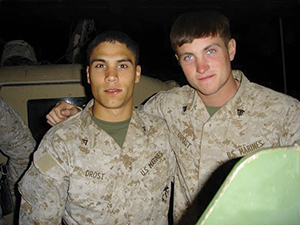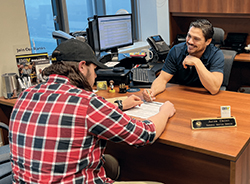
Brother- and sisterhood is emblematic for anyone who has served in the military. Marine Corps veteran Jacob Drost and his younger brother, Isaac, take this concept to another level.
The brothers grew up in northeast Ohio and joined the Marines about six months apart. They took different paths in their military careers, with Jacob becoming a machine gunner and Isaac becoming a scout sniper.
In 2004, Isaac was on a deployment with the 2nd Reconnaissance Battalion in Fallujah, Iraq, when he was hit by an improvised explosive device and sustained a shrapnel injury to his leg. However, the injury was not severe enough to be medevaced out of the country, so he stayed in the area with his unit during his recovery.
A few months later, Jacob deployed with the 1st Battalion, 6th Marine Regiment, to Camp Baharia, just outside of Fallujah where his brother was recovering from his injuries.
While being overseas is a challenging experience for some, the Drost brothers found moments to bond with each other during their overlapping deployments. Occasionally, Jacob’s unit would visit Camp Fallujah, allowing him to see his brother on the mend.
After completing their four years on active duty, both brothers returned home and filed disability claims for the injuries they incurred during their military service. The duo also started working at their father’s masonry company.
In 2008, the economy took a significant downturn and jobs at the family company began to become less frequent. As a result, the brothers started to think about alternative careers.

Isaac, married and with a young child at the time, was looking for stability for his family and found a job in the security industry. Jacob took a different path and trained to become a DAV benefits advocate, thanks to a referral from a man he met while working at a local veterans memorial.
“I didn’t have a lot of experience in an office environment when I first started. But DAV reminded me of the Marine Corps. There’s a sense of camaraderie—and we’re the best at what we do. So I hunkered down and embraced the training, because I could tell I’d need it to help the veterans we serve.”
Jacob’s training to become an accredited benefits advocate has proven invaluable to himself and the thousands of veterans he has represented in the years since, including his brother.
Isaac, like many veterans, had filed for disability compensation without professional representation. When he received his Department of Veteran Affairs disability award letter, he informed his brother about the rating he received.
Armed with knowledge of his brother’s extensive injuries from service, Jacob asked to review the claim, found an error and then re-filed on his brother’s behalf.
Months later, Isaac received an increase in his VA disability rating, along with significant backpay. These benefits were life-changing for Isaac and his family, which had grown since his initial filing. He was able to leave the security industry, go back to the family company (which could be registered as a service disabled veteran-owned business with his ownership stake) and grow the enterprise.
“It’s difficult to navigate the VA system on your own, especially when you have a family, job and other commitments,” Isaac said. “It’s nice to have someone in your corner that knows how to navigate this process, and I was fortunate that it was my brother.”
At his brother’s urging, Isaac joined DAV and has since encouraged other Marines he served with to contact Jacob when they need assistance filing VA claims. Their brotherhood now extends to all the fellow veterans they are helping with the guidance of DAV.
“Isaac’s story is a great example of the importance in having professional representation in filing a VA claim,” said DAV National Service Director Jim Marszalek. “This case is unique, but our benefits advocates treat everyone as if they are family and provide best-in-class service for anyone that needs claims assistance.”
“All of us—veterans and civilians alike—have a role to play in supporting those who bear the burden of war,” Jacob said. “I am thankful to all my peers for their service and the role I have in helping them ease that burden.”






